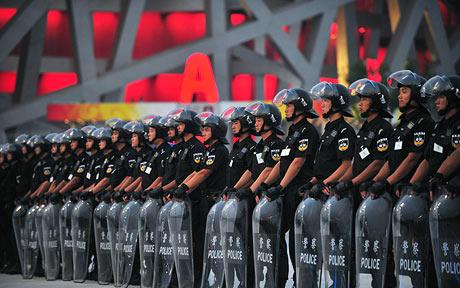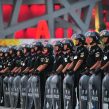
CCP Campaign for a New Generation of “Red and Expert” Officials
Publication: China Brief Volume: 9 Issue: 13

While the Chinese Communist Party (CCP) must have heaved a sigh of relief over the relatively uneventful 20th anniversary of the June 4, 1989 crackdown, central party authorities are adopting extra measures to defuse tension between local officials and the masses. Widespread anger at the callousness, corruption and other misdemeanors of cadres, particularly those at the level of counties and below, is deemed a main factor behind the tens of thousands of riots and protests that occur every year. The latest such disaster, where some 10,000 peasants from Shishou town, Hubei Province clashed last week with police due to the latter’s alleged cover-up of the suspicious death of a local resident, has followed upon the heels of similar incidents in Hainan, Guizhou and Yunnan the past year. In all these cases, law officers and other grassroots personnel offered protection to the rich and powerful instead of helping citizens who were victimized by corrupt cadres or triad elements (Reuters, June 21; Ming Pao [Hong Kong], June 22; Outlook Weekly [Beijing] January 6). Starting in the spring, the CCP Organization Department (CCPOD) and other high-level departments have launched an unprecedentedly large-scale campaign to “retrain” grassroots-level personnel ranging from civil servants to police officers and judges. The goal is apparently to nurture a new generation of officials who are “both red and expert,” meaning that they are politically correct, morally above-board and professionally competent.
In early summer, the CCPOD dispatched around 10,000 inspectors to local-level administrations to check on the livelihood of peasants as well as the “governance capability” of grassroots officials. As Organization Chief and Politburo member Li Yuanchao indicated, CCPOD cadres must “have a better grip on the situation and a deeper understanding of the grassroots.” While Beijing has not disclosed the number of corrupt or incompetent cadres who have been sacked, it seems clear that these CCPOD “plenipotentiaries” are eager to flush out the bad apples. More significantly, Li has passed along his mentor, President Hu Jintao’s concern for propagating officials who can better handle the increasingly complex “social contradictions” at the level of villages, towns and counties. This was behind the decision earlier this year to send several thousand county chiefs for short- and long-term programs at Central Party School centers in Beijing, Shanghai and Jinggangshan, Jiangxi Province. The CCPOD has also boosted the number of fresh college graduates who are being recruited as cunguan, or “village cadres.” In Yunnan Province alone, more than 60,000 college graduates are vying for 10,000 cunguan positions. Henan Province Party Secretary Xu Guangchun indicated last month that it might be a good idea for universities to offer more courses on different aspects of village-level administration so that graduates can seek a rewarding career as cunguan (Xinhua News Agency, June 4; People’s Daily, January 9; China Youth Daily, June 5; Collegenews.cn, May 17).
Even more unusual is the simultaneous training of grassroots police and prison officers, presecutors, judges, as well as cadres working in the disciplinary inspection committees of counties and other local governments. In China, the Central Commission for Disciplinary Inspection (CCDI), which is headed by Politburo Standing Committee member He Guoqiang, is the highest anti-graft agency. The CCDI has branches in all provinces, cities and counties. For example, 3,080 county-level police officers have just finished refresher classes in the Beijing headquarters of the Ministry of Public Security. Apart from boning up on the law and latest developments in information technology, the senior cops took courses on “the construction of harmonious relationship between the police and the people.” Similarly, judges and judicial personnel based in intermediate and lower-level courts will, starting in July, undertake a year-long program at legal and administrative institutes in the capital. The slogan of this gargantuan re-education campaign is: “the people’s judges must work for the people” (People’s Daily, June 5; Xinhua News Agency, June 8).
Owing to the ever-increasing cases of confrontation—and sometimes outright battles—between the police and disadvantaged groups such as poor peasants, the re-education of public security officers has drawn the most attention from the Chinese media. Police chiefs have waxed eloquent on the fact that their staff should have acquired “five major capabilities” after their half-year training in Beijing. These include the ability “to build up harmonious ties with masses”; “to implement the law in a rational, peaceful, civilized and regulated manner”; “to strengthen and improve ways to provide guidance to the media”; “to raise IT standards and to boost their capacity to put [theories] into practice at local levels”; and “to better prevent and adequately handle emergency incidents.” According to Minister of Public Security Meng Jianzhu, who is personally in charge of the training, “police officers should avoid being carried away and becoming emotional when facing complicated situations.” Meng, also a State Councillor, added that “police should avoid using excessively strong language or employing undue force” in tackling suspects (CCTV news, February 27; Xinhua News Agency, February 19).
In a similar vein, the President of the Supreme People’s Court (SPC) Wang Shengjun expressed confidence that more training will boost the political as well as professional standards of the nation’s judges. In the past couple of years, the reputation of the judicial system has been dented by corruption scandals involving senior judges such as former SPC vice president Huang Songyou. Huang, together with a number of associates, was detained late last year for allegedly accepting millions of yuan worth of bribes and kickbacks. In a recent speech on the “construction of judicial human resources,” Wang noted that judicial personnel must be imbued with the spirit of “running the courts with seriousness, boosting the credibility of and popular support for the courts, and strengthening the courts with science and technology.” “We must have a corps of judicial staff who is politically reliable, professionally up to scratch, devoted to the people, as well as fair and uncorrupt,” he added (Chinacourt.org, April 29; Xinhua News Agency, June 17).
While training of this unprecedented magnitude is a step forward for boosting administrative effectiveness, there are doubts as to whether the lofty objectives envisaged by the likes of Politburo member Li or Chief Judge Wang can be realized. One problem is that excessive premium seems to have been placed on “redness” as opposed to “expertise.” Take for example, the pronouncements of Vice President Xi Jinping, who, as President of the Central Party School, is a key mastermind behind the nationwide re-education exercise. In speeches on criteria for promoting cadres, Xi has reiterated that “while we emphasize that cadres must pass muster in both morality and [professional] competence, morality comes first” (People’s Daily, June 12; Xinhua News Agency, March 30). In his admonishments for judges, Chief Justice Wang has invariably urged them to follow this hierarchy of values: “giving top priority to the [Communist] Party’s enterprise, the people’s interests and [the sanctity of] the Constitution and the law.” “Let’s diligently build up a corps of high-quality judicial personnel that can reassure the Party and let the people be satisfied” (Xinhua News Agency, April 29). Loyalty to the party, then, is clearly considered by the CCP to be more important than the officials’ professional standards as well as their ability to meet the demands of the populace.
Moreover, at least a good part of the re-education campaign is centered on baowen, or “safeguarding stability”—codeword for defusing challenges to the CCP—rather than promoting good governance as such. During the training of the 3,000-odd police officers, senior instructors repeated President Hu’s mantra for what party leaders consider to be a trouble-prone 2009: “We must ensure economic growth, safeguard the people’s livelihood, and preserve stability.” Another favorite slogan cited during courses for grassroots cops was that of State Councillor Meng: “A minor incident should be solved within the village; even a major incident should be tackled within [the parameters of] towns and townships. Do not let [social] contradictions go all the way up to the central authorities” (China.com.cn, February 26; Yangcheng Evening Post [Guangdong], February 18). In other words, what central authorities are looking for in local-level officials are superb fire-fighting skills rather than exceptional dedication to or capability for public service.
Moroever, training or re-training cannot be a substitute for the wholesale professionalization of the Chinese cadre and civil service. The State Council or Central Government has, since the start of the reform era, been generous with capital projects, particularly the building of infrastructure ranging from highways and railways to industrial parks. For example, much of the 4 trillion yuan (about $570 billion) that Premier Wen Jiabao approved last November for resuscitating the economy has been earmarked for infrastructure improvement. Yet, relatively little government expenditure has gone into boosting professional education. A recent report by the Ministry of Land and Natural Resources, which has also embarked on a massive re-training of its staff, revealed that only 12 percent of its 122,000 grassroots officials have professional qualifications in fields such as land surveying or mining administration, and each of the ministry’s 25,000 local-level offices boasts less than one professional staff (People’s Daily, June 21).
The insufficient weight given to professionalism is evident even in the critical field of justice. While more than 300,000 students are studying in China’s 634 law schools, a sizable number of courts and prosecutors’ offices, particularly those in the central and western provinces, have had difficulties hiring qualified personnel. In a much-noted speech earlier this year, Politburo Standing Committee Member Zhou Yongkang pointed out that to make up for the shortfall of qualified legal personnel in the heartland regions, relevant judicial departments can recruit reliable high school graduates among soldiers or People’s Armed Police officers—and then send them to a selected number of legal institutions for special intensive training. Particularly for police, prosecutors and judges serving in trouble-prone spots in Tibet and Xinjiang, more emphasis seems to be placed on their ability to toe Beijing’s line than either professional qualification or competence (Xinhua News Agency, February 1; Beijing Evening Post, March 9; Xinhua News Agency, June 5).
On October 1, the CCP authorities will be hosting a big party, including a gargantuan military parade at Tiananmen Square, to celebrate the 60th birthday of the People’s Republic of China. Ensuring that no “destabilizing factors” such as peasant riots will mar national spectacles of this nature—which are deemed essential to boosting nationalism and bolstering the party’s legitimacy—is one factor behind the Hu-Wen leadership’s anxiety to improve the political rectitude and crisis-management skills of civil servants. Yet, while training programs that prioritize values such as prolonging the CCP’s mandate of heaven or “nipping factors of instability in the bud” could buy the administration some time, it is unlikely that they will effectively eradicate endemic corruption and misrule at the party’s grassroots.





